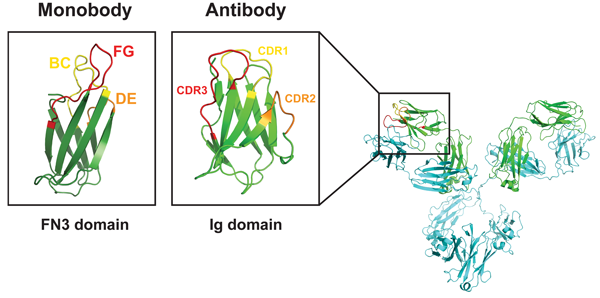Among the NCCR, four research groups have as common theme the use of protein engineering to generate protein-based tools for visualization and manipulation of biochemical activities. One of them develops versatile small antibody mimics (monobodies) as tools for chemical biology.
Interview with Professor Oliver Hantschel, Principal Investigator

Could you give us an insight in the project and the approaches that are being pursued?
The main aim of this project is to use protein engineering to generate new tools for studying and manipulate biological processes. There is a considerable synergy between as well as complementation of the great expertise in chemical synthesis, proteomics and cell biology that has been built up during the first funding phase (2010-2014) of the NCCR Chemical Biology. In the different subprojects, we are developing engineered monobody proteins that bind with high affinity and specificity to the centriolar SAS-6 proteins or to proteins involved in tyrosine kinase signalling for subsequent mechanistic studies. In addition, expressed protein ligation is used to generate tubulin proteins with defined post-translational modifications to study their role in asymmetric vesicle trafficking and in centriole formation. Finally, we aim at developing a fluorescence sensor for acetyl-CoA to study acetyl-CoA homeostasis.
What are the main scientific advances achieved by your project after 6 years of research and during this past year in particular?
My lab has been able to set-up an efficient screening platform for the generation of monobodies using phage- and yeast-display screening. Besides several high-affinity antagonists that target protein-protein interactions involved in cell signalling, we are particular excited about the first monobody clones binding to the centriolar SAS-6 protein that we are currently characterizing with the Gönczy lab. We have also started collaborations with other NCCR labs on cellular delivery of monobody proteins (Matile lab) and to develop monobody binders to additional challenging targets (van der Goot and Manley labs).
You are interested in Tyr-kinases, their signalling, and in innovative manners to modulate these. How did the research of this project contribute to the progress of your research? What were the roadblocks on the way and how did you deal with these?
The support from the NCCR Chemical Biology has enabled me to set-up the monobody screening platform in my lab and catalyzed a number of collaborations that gave us access to expertise and methods that have helped ongoing projects. Most importantly, the successful set-up of the monobody screening platform has been a strong asset for the award of an ERC Consolidator Grant.
What do you see as major applications of the results of your research?
A common aim of most projects in my lab is to identify novel and unconventional targeting mechanisms for oncoproteins. We have demonstrated that monobodies can be used as versatile target validation tool in case small molecule inhibitors are not (yet) available. So, aside from providing a strong rationale for the development of small molecule inhibitors to hitherto untargetable oncoproteins, we also explore if monobodies can be used as protein-based drugs. This requires that we overcome two major challenges: efficient delivery of monobody proteins and improvement of pharmacokinetics and immunogenicity.
What would be your “dream” discovery?
We hope to develop a monobody inhibitor that targets an oncogenic transcription factor, which could be efficiently delivered to the nucleus of cancer cells in a mouse model. This will be an important step towards a possible translation of this technology for cancer patients.
 Oliver Hantschel is Tenure Track Assistant Professor at the EPFL School of Life Sciences. He was awarded the first ISREC (Swiss Institute for Experimental Cancer Research) Foundation Chair in Translational Oncology and in 2016 an ERC-Consolidator grant.
Oliver Hantschel is Tenure Track Assistant Professor at the EPFL School of Life Sciences. He was awarded the first ISREC (Swiss Institute for Experimental Cancer Research) Foundation Chair in Translational Oncology and in 2016 an ERC-Consolidator grant.

Leave a comment
The editors reserve the right not to publish comments or to abridge them.